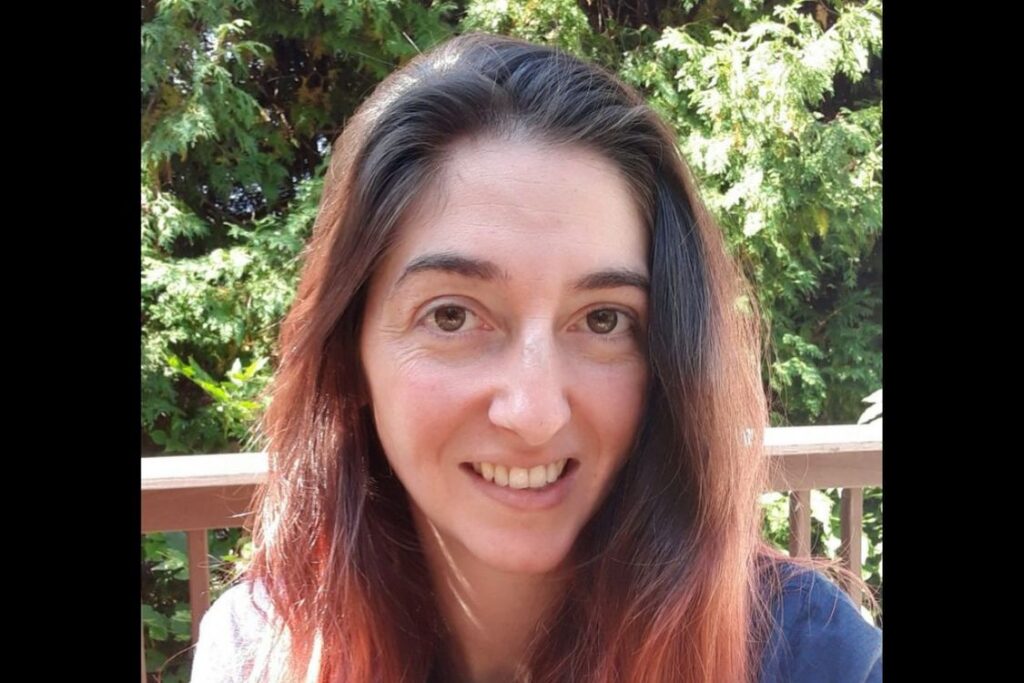Like in Christopher Nolan’s film Inception (2010), Michelle Carr hopes to directly modify our dreams with “dream engineering”.

Hugo Jacquet
What if it were enough to look at things better in order to sleep better? This is what Michelle Carr hopes to discover. Carr, an assistant professor in the Département de psychiatrie et d’addictologie at the Université de Montréal, has just been named a researcher at the cinEXmedia partnership in order to carry out intersectoral projects combining cinema studies and the science of sleep.
Carr has been working for more than a decade at clearing up the mysteries around sleep. Her ambition is to “understand how to influence the content of dreams through cinema and how to put cinema to use for therapeutic purposes”.
To achieve this, Carr employs “dream engineering”, a method she developed and which consists in using technology to manipulate dreams and improve memory, creativity and well-being. “For example, I make a connection between participants’ dreams and certain filmic stimuli which preceded their falling asleep, such as sounds or visual effects. Then, while they sleep, I reproduce these stimuli by playing a film’s sound, for example, to influence their dreams, a little as if I were infiltrating them. The idea is to identify the conditions for creating pleasant dreams, and to maximise these conditions”.
Sorting out the True from the False
The participants in Michelle Carr’s project come from every background. Her work with the cinEXmedia partnership is aimed at anyone who would like to improve their sleep and who may be having difficulty navigating the abundance of advice one finds on this topic on social media and in magazines. Meditation and breathing exercises, sleep-inducing reading, beauty rituals: each person has their own routine for falling asleep faster. “One study proves the benefits of essential oil of lavender placed on the pillow, while others suggest circulating agreeable scents in the bedroom”, Carr explains. “So yes, that can work even so”.
However, the researcher warns against other common assumptions: “It was long thought that deep sleep [one of the three phases of sleep] was the condition for restful sleep, because brain activity is low. In fact, our research shows that REM sleep, during which brain activity is very intense as we dream, is even more decisive for feeling rested when we wake up.” Asked what the criteria are for good sleep, Carr reminds us of the importance of qualitative factors. Astonishingly, physiological factors (heart rate, cerebral activity, etc.) are not always consistent with the real experience, she explains: “Some patients say they suffer from insomnia, whereas in reality they have very full nights of sleep. The medical profession has often ignored what these patients feel, focusing instead on scientific measurements. My research focuses, precisely, on the more subjective and more intuitive aspect of sleep. This is work that cinema can help me carry out”.
Dreaming in Cinema
With her medical expertise, Michelle Carr is delighted to join a laboratory made up primarily of specialists in cinema: “My discussions with Santiago Hidalgo [executive director of Laboratoire CinéMédias] were very stimulating. His expertise shows an entirely different way of speaking about cinema. I have already worked with visual stimuli, but these were all conceived by scientists who didn’t know much about cinema.… All that was said was ‘this is a positive stimulus, this is a negative stimulus’. Santiago Hidalgo shows us all the cinematic qualities which affect our experience, and he helps us locate the truly significant stimuli”.
On the topic of the depiction of dreams in the media arts, and in particular in films, Carr observes the same recurring motifs: “It’s as if a filmmaker had suggested that dreams be depicted a certain way and inspired all the other filmmakers. It is very difficult to depict in images what a dream really is. But films such as Christopher Nolan’s Inception are quite faithful to reality! They give a good idea of what lucid dreams can be, for example”.
It was by experiencing a lucid dream herself that Michelle Carr decided to explore the phenomenon. And she is not alone in turning to this topic of study. Since her beginnings at the University of Rochester, in the state of New York, where she began to study the cognitive sciences, Carr has remarked that the scientific community has paid increasing attention to sleep and to dreams: “Research into sleep began to be more democratic in the 1970s. That’s quite recent, but there already exists a ton of studies which show the connection between the quality of sleep and vital functions such as cognition, emotions, and physical health in general. Research into dreams is even more recent”. She explains that nightmares first attracted the attention of researchers, pointing out that they are one of the main symptoms of Post-traumatic Stress Disorder: “Some dependent people, for example, dream of taking drugs. If one can succeed in reducing the number of nightmares, one can perhaps accelerate the person’s recovery”. She even raises the possibility of developing a mobile application to generate particular stimuli to facilitate falling asleep.
While we wait for this miraculous application, we asked Michelle Carr for a few recommendations for sleeping better. While she does not yet have all the answers, which will surely come as her work with cinEXmedia advances, she recommends that one watch “a contemplative and very slow film, with a single camera angle and a single action in real time. Something not very stimulating, in fact”.
